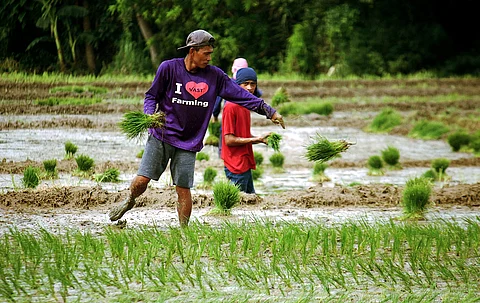
- NEWS
- the EDIT
- COMMENTARY
- BUSINESS
- LIFE
- SHOW
- ACTION
- GLOBAL GOALS
- SNAPS
- DYARYO TIRADA
- MORE

“Some of the worst things imaginable have been done with the best intentions.”
With the intention to lower the prices of rice and improve farm productivity, benefiting both end-users and farmers, the Rice Tariffication Law (RTL) was enacted in 2019, replacing the quantitative restrictions on rice importation with a tariff system.
It might have been the best intention for some, but it has been one of the worst things imaginable that was done to the Filipino farmers.
For you see, the RTL has made a negative impact on the Filipino farmers by causing a significant decrease in palay (unhusked rice) prices, reducing their net income and profitability, and raising concerns about worsening rural poverty and livelihood displacement.
Sure, it was consumer-friendly, per se, creating competitiveness within the rice industry. But instead of a price drop, consumers experienced an increase in prices. The economic burden fell disproportionately on farmers, especially due to increased competition from liberalized imports.
Fast forward to 2025, the current administration, which inherited the law from the previous administration, is now appealing to lawmakers to back proposed amendments to the RTL, saying the current version has failed to protect local farmers and left the industry exposed to market volatility.
Agriculture Secretary Francisco Tiu-Laurel Jr. made a presentation before the House Committee on Agriculture and Food, chaired by Quezon Rep. Wilfrido Mark Enverga, describing the RTL as a “well-meaning policy” with provisions that had unintended consequences, particularly on the welfare of Filipino rice farmers.
“Rice is more than just a staple. It fuels our workforce, sustains our families, and symbolizes food security for over 112 million Filipinos,” he said.
Now why would he do such a thing? Well, after a temporary suspension of rice imports in late 2025, farmgate palay prices saw an increase in some areas of the Philippines, ranging from roughly P16.98 to P20.59 per kilo, though prices in other regions, such as Cagayan Valley, saw prices drop to as low as P14.43 per kilo.
The price slump preceding the suspension drove prices as low as P8 per kilo due to the RTL liberalizing imports, with the suspension aimed at stabilizing prices and supporting farmers.
Tiu-Laurel said the RTL’s full liberalization of rice imports stripped the National Food Authority (NFA) of its mandate to regulate supply, stabilize prices, and intervene during crises —effectively placing farmers at the mercy of market forces.
The result, he warned, has been unsustainable palay prices, driven down by a flood of cheap, high-quality imported rice.
Last month, farmgate prices reportedly fell to as low as P8 per kilo, well below the cost of production, even for the most efficient growers.
And yet, the plea of the Agriculture Secretary may have fallen on deaf ears as the authors of the RTL stay mum on what could help the Filipino farmer regain the edge in the competition in the rice industry.
One vocal person, Utak Magsasaka Novo Ecijano (UMANE, Inc.) Secretary Rudy San Antonio Bernardo, said that the authors of the RTL remain silent as their constituents cum rice farmers continue to lose their livelihood due to this man-made calamity.
Bernardo said that the RTL is the very reason why imported rice has flooded the market in a deemed agricultural country, with the price of palay plummeting due to continuous losses.
Bernardo said, “Ang inyo pong pananahimik ay tuluyang pumapatay sa kabuhayan ng mga nagtatanim para sa bansa.”
These authors, mostly representatives of the province of Nueva Ecija that should have represented the farmers of the area, are ruining the Rice Granary of the Philippines, Bernardo cited.
The RTL started from House Bill No. 7735 or the Revised Agricultural Tariffication Act, and Senate Bill No. 1998 or the Quantitative Import Restrictions on Rice.
House Bill 7735 was issued on May 21, 2018 and was signed by 54 representatives led by Jose Panganiban Jr., ANAC-IP (Ang National Coalition of Indigenous Peoples) Partylist Representative.
The co-authors of the RTL include former district representatives of Nueva Ecija such as Estrelita ‘Ging’ Suansing of the 1st District, mother of Congresswoman Mikaela ‘Mika’ Suansing; Micaela ‘Mikki’ Violago the former representative of 2nd District; Rosanna ‘Ria’ Vergara, wife of Congressman Julius Cesar ‘Jay’ Vergara of the 3rd District; and Magnolia Antonino-Nadres, former representative of the 4th District.
The RTL was approved on August 14, 2018 with 200 votes for yes, and seven for no, while two abstained.
The worst part is that the lowest price of palay plummeted to P6 per kilo on July of 2025, during the wet season harvest.
